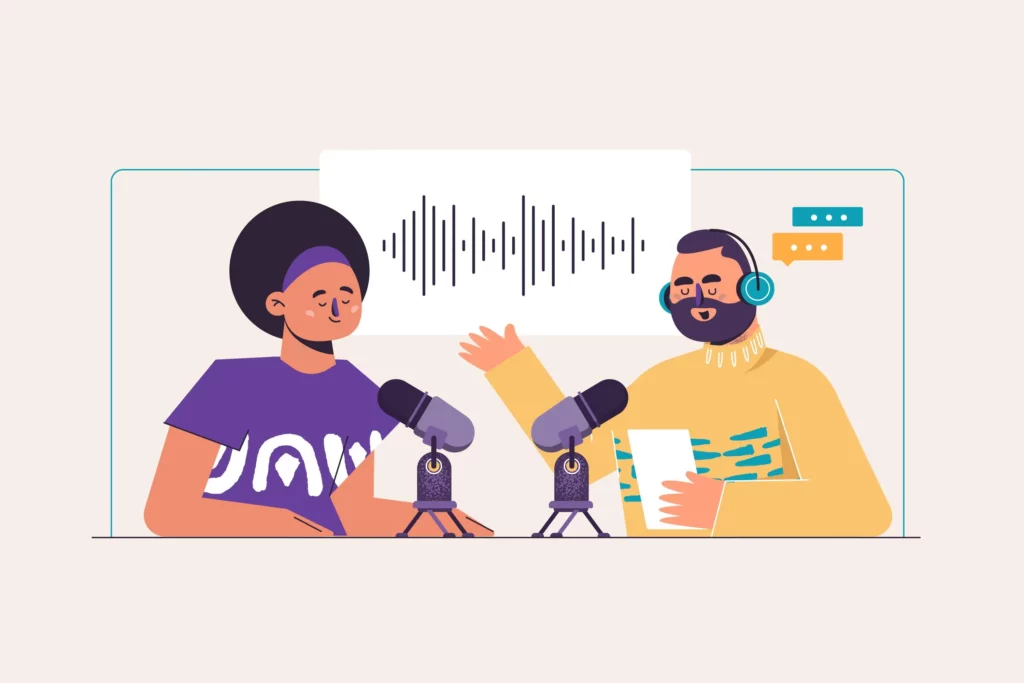Telling It Like It Is In Podcast Performance Marketing
The market for podcasts looks different across the Atlantic.
Performance marketing accounts for over 50% of the $1.8 billion US podcast advertising market (projected to reach $2.3 billion by the end of this year). It’s less than 20 percent of the podcast ads in the UK, according to Christiana Brenton, co-founder of Telling, the new podcast media agency and consulting.
Performance marketers have long supported the US podcasting industry and have played a role in its success, According to Telling founder Georgina Holt. Brands such as BetterHelp, MailChimp, and Casper have utilized their budgets for podcast marketing to attract and convert new customers.
However, the UK podcasting industry is “hard on the brand dollars,” Holt stated. Major holding firms and ad agencies drive higher funnel spending with the lens of a brand.
With the economic uncertainty, pressure is being placed on CMOs and finance directors to provide ROI for every dollar of their advertising budgets. “We want to demonstrate that podcasts are a great tool to drive those lower-funnel metrics, those sales conversions,” Holt explained. “We also know that podcasting can influence the whole marketing funnel if you do it strategically.”
Let me explain to you.
Telling It launched on July 1st as the UK’s first agency for podcasts and is now focusing on growing DTC companies in the UK and European markets and US DTC brands that are expanding their reach globally.
The agency has already begun cooperating with the first of its clients, Myndlift, on a three-month US trial campaign. The DTC consumer tech wearable brand purchased three sponsorship deals for shows. It will run audio ads on over 50 business and news podcasts, including The BBC, The Financial Times, The Economist, and The Guardian. The brand is a “perfect client” for podcast ads, Holt said, because it is an excellent medium for educating people about the benefits of technology. This campaign, Myndlift’s debut podcast test – includes personal endorsements from hosts as well as producers who read the scripts.
The agency will keep track of CPA results through unique discount codes for podcasts that can be redeemed through Myndlift’s website. Myndlift website, as well as pixel-based attribution, Brenton said. Telling will share the campaign results with Myndlift to expand its operations by increasing its trial and website traffic and subscriptions in the long run, including across Europe, the UK, and Europe.
Brenton said that Telling collaborates with various brands to create live briefs tailored explicitly to the UK markets.
The sole Telling team members are founders Holt and Brenton. Brenton points out about marketplaces and advertisers, whereas Holt directly contacts publishers, creators, and agents.
The founders are Acast alumni and podcasting veterans working in conjunction with US, UK, and Australian media companies and see it as an advantage over different agencies.
“We have been exposed to the results of hundreds and hundreds of podcast campaigns by working at the world’s biggest independent podcast marketplace,” Brenton added, and “two decades of tests-and-learns from DTC brands in the US.”
Although she was hesitant to reveal the exact formula of flighting parameters, podcasts, and creative Telling utilized to boost the growth of advertisers in measurable ways, she did stress the importance of choosing the best hosts, letting hosts of podcasts conduct tests on products to tailor endorsements and also recognizing that mid-roll ads are more effective than the pre-roll ads.
Programmatically pushing
The industry of podcasts is hesitant to embrace the idea of programmatic podcasting.
“There’s certainly a conception in the performance world that it’s only host-reads that can drive those bottom-funnel sales conversions,” Brenton explained. However, at Acast, she experienced the power of programmatic firsthand. Be.
During one Orangetheory Fitness test case, the exercise chain conducted an audio test campaign that included streaming audio. The test campaign ran its audio ads by programming them into The Trade Desk, using Acast’s historic first-party data and content signal reporting within The Bidstream to improve the campaign’s performance in real time. Podcasting resulted in an increase of 16% in CPA than any other audio-related inventory we tested and proved the effectiveness of precise targeting based on audience tools.
“When planned correctly, with the right targeting and creative, you can deliver CPA” through programmatic advertisements, Brenton said.
Of course, in the UK and throughout Europe, Telling will run through GDPR, which blocks the agency from conducting the first-party process of onboarding data. However, Telling can work around this issue with a few tricks.
For instance, it could use Nielsen third-party audiences to identify audiences similar to yours and collaborate with local businesses (or directly with the creators) to gather information on particular target groups and test strategies like audience surveys and social profiling.
It is keen to explore technology ranging from attribution and measurement tools to brand safety technology and AI. Particularly, AI programs might enable more precise and targeted targeting of locations that would allow advertisers to track various advertising variations and personalize advertisements that hosts read. “Performance increases with greater relevancy and context,” Brenton stated.
Performance is just one part of the overall picture.
Podcasting draws in loyal listeners willing to spend “hours and hours with their beloved shows every week,” Holt explained. However, marketing ad dollars don’t reflect that devoted attention, even though the focus is the key to conversions.
“In the short term, it’s the performance marketing story,” she explained. “In the longer term, it’s the audio investment gap story.”

